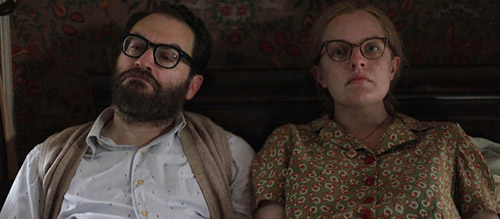Shirley (2020) Review
Shirley (2020)
Director: Josephine Decker
Screenwriter: Sarah Gubbins
Starring: Elisabeth Moss, Michael Stuhlbarg, Odessa Young, Logan Lerman, Robert Wuhl, Paul O’Brien, Orlagh Cassidy
Shirley is an absolutely fascinating exploration of creativity and obsession, the latter painful stage of “The Haunting of Hill House” author Shirley Jackson’s life used as as a staging ground for an odyssey into her contradictory and troubled mind.
Agoraphobic horror writer Shirley Jackson’s (Elisabeth Moss) husband Professor Stanley Hyman (Michael Stuhlbarg) invites a young and expecting couple, Rose (Odessa Young) and Fred (Logan Lerman), to live with him and his troubled wife, the expectation being that they help to keep the house and work to look after an erratic Shirley who is struggling with writer’s block. But, as the stresses of work, their strange new domestic life and impending parenthood begin to strain Rose and Fred’s marriage, their hosts prove to be less than hospitable, with what is real, imagined and wished for henceforth seeming to blur together.
Some of the most withering put-downs of the year are here, usually ricocheting between Jackson and the oppressively controlling Stanley: “I’d say you were smitten.” / “I don’t smote!”; “He’s terrifically competent – there’s no excuse for that!”. Let’s not sugar coat it, Shirley and Stanley are awful people – both brilliant, but still awful, and very hard to sympathise with. Stanley’s manipulation and control of his wife rolls over to them both looking down on and taking advantage of the young couple sharing their house, and both seem to perversely enjoy the suffering of others. Stuhlbarg is rictus-inducingly repulsive, while Moss is flawless (as always) at playing flawed. This film rivals even I’m Thinking of Ending Things for having the most fist-bitingly uncomfortable dinner table scene of 2020.
Does a woman with such imagination and creative talent need the validation of a man like Stanley? Of course not, but his psychological and emotional manipulation of her over many years has made Shirley think that she does. He demands to read everything she writes and provides patronising notes, no matter how early in the creative process she may be at the time. When Rose reads Shirley’s work without permission, initial vitriol is evolved into a fast and intimate bond, with Rose becoming Shirley’s confidant and more.
As the film progresses, Shirley’s obsessive and all-consuming research into her latest novel seems to gain a life of its own. In reading police reports on the murder of a local college student as inspiration for her latest novel, she visualises Rose as playing her in the film running in her own mind – the physical existence of Rose (herself a fictional character in a biopic) seems to fluctuate, and her identity seems to merge with that of Shirley’s from time to time. Shirley Jackson’s own children aren’t a presence in this story, but she shares the burden of oncoming motherhood with Rose, and their respective roles as caregiver and dependent reverse as time passes, Shirley gaining strength and Rose losing hers, the latter spiraling dangerously. This relationship dynamic between two women is particularly important as their husbands become increasingly absent and ever more obviously up to no good.
The film’s creeping, crawling score by Tamar-kali simultaneously manages to get under your skin while also being evocatively beautiful. It provides a disturbing undercurrent to the chaotic mind of a genius but also lifts the raw emotionality and soulfulness at the heart of the story. This is a tale of obsessives, of people who excel and are driven to do one thing in life at the cost of everything and everyone else.
This is an extremely malleable reality, like a clay sculpture still taking shape; it has to be seen as a theoretical, conceptual and fictionalised version of what may happen when a creative’s creations take over. Much as is the case with Bill Condon’s sort-of-biopic of James Whale, Gods and Monsters, a key period in an artist’s life is used only as a jumping-off point, with Josephine Decker using some of the writer’s own storytelling tricks and her own mastery of mood and tone to weave a hypnotic albeit challenging tapestry of a character piece.
22/24


